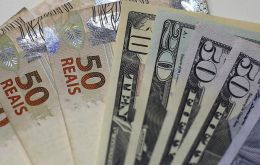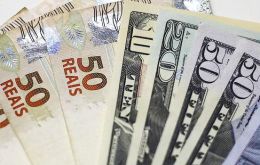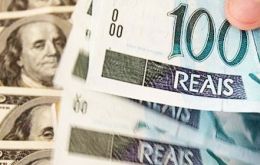MercoPress. South Atlantic News Agency
Tag: Real Dollar
-
Thursday, February 27th 2020 - 08:49 UTC
Brazilian markets reopen to a shock and the Real weakens to a new low

Brazil's Real touched a record low on Wednesday as traders returned from the Carnival holiday only to be alarmed by concerns about the spread of the new coronavirus after Sao Paulo confirmed its first case. The Real weakened 1.1% to 4.4470 against the dollar, as it led declines among other Latin American currencies.
-
Friday, August 16th 2019 - 12:55 UTC
Brazil's central bank will sell dollars in the spot currency market; first time in a decade

Brazil’s central bank announced it would sell dollars outright in the spot currency market this month for the first time in over a decade, changing its regular market operations in response to rising demand for liquidity.
-
Tuesday, November 10th 2015 - 07:13 UTC
Brazilian economy forecasted to contract 3.10%, says central bank survey

Brazil's economy will contract by 3.10% this year, with the inflation rate hitting 9.99%, the Central Bank said Monday, citing its weekly survey of private sector economic analysts. Last week, analysts said they expected Brazil's economy to contract by 3.05% this year and the inflation rate to be 9.91%.
-
Monday, September 28th 2015 - 10:35 UTC
Brazil has sufficient reserves, but Rousseff concerned about companies with dollar debts

Brazil President Dilma Rousseff cited the nation's foreign currency reserves as a backstop to excessive volatility and weakness in the Brazilian Real.
-
Tuesday, September 22nd 2015 - 06:49 UTC
Brazil's Real at almost four to the US dollar; 70% weaker in the last 12 months

Brazil’s currency closed on Monday at the weakest level ever against the dollar as raging economic and political situations increased uncertainty and the odds of the country losing its investment-grade credit rating from yet another ratings company, which could be catastrophic.
-
Tuesday, September 1st 2015 - 06:36 UTC
Brazil presents 2016 budget and Real drops to a 12-year low against the dollar

Brazil's government presented a 2016 budget Monday that for the first time projects the world's seventh largest economy operating in the red, sparking worries that the country's investment grade rating will be put at risk.
-
Monday, August 3rd 2015 - 09:40 UTC
Brazilian currency at its weakest against the US dollar since March 2003

The Brazilian currency Real lost 1% at the end of trading on Friday and begins this week at 3.42 Reais to the US dollar, the lowest in twelve years, because of the political and economic uncertainties surrounding Latin America's largest economy.
